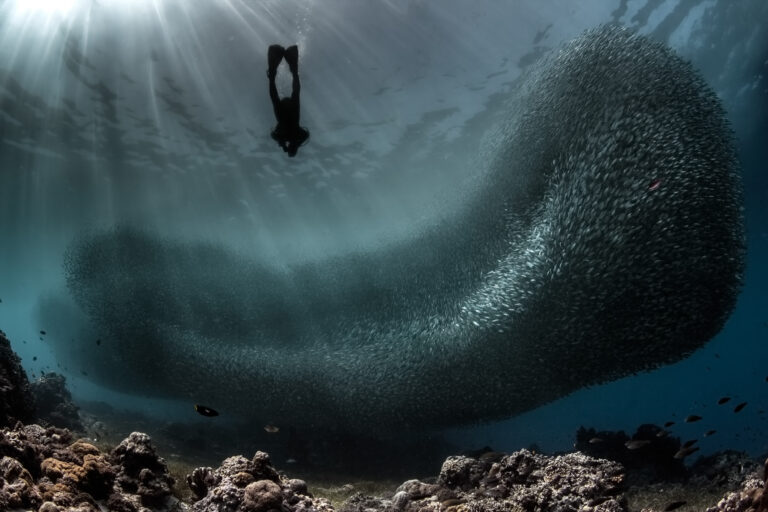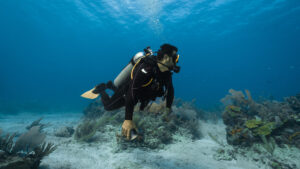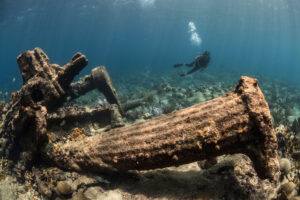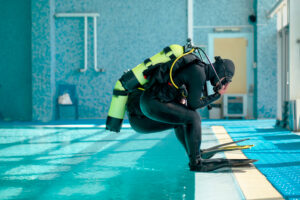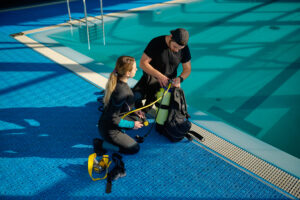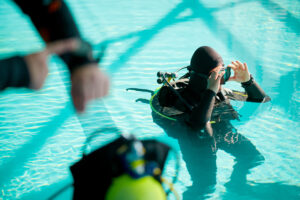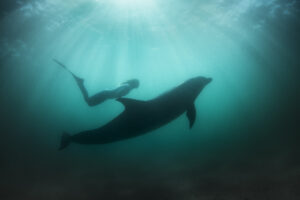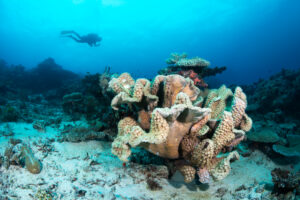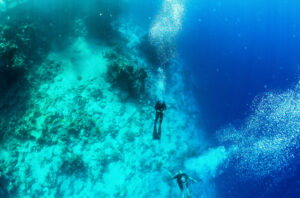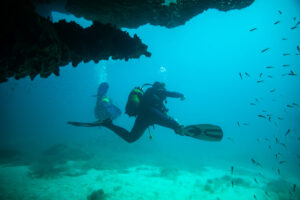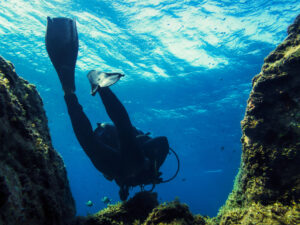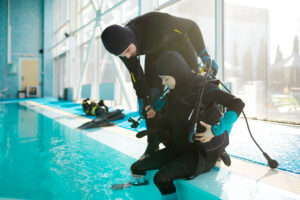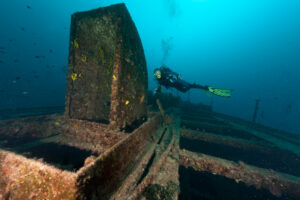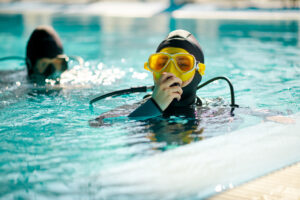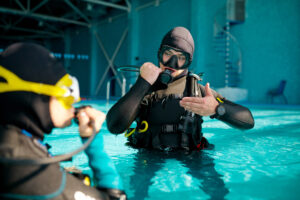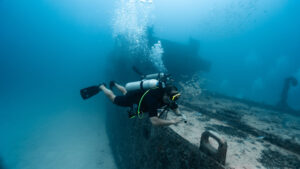What is Professional Diving?
Professional diving encompasses a range of underwater activities performed by individuals trained and certified to work in various underwater environments. These divers are equipped with specialized skills and equipment to carry out tasks that support industries such as commercial oil and gas, scientific research, military operations, and public safety. The importance of professional diving lies in its contribution to the economy, scientific discoveries, and public safety operations, making it an indispensable occupation with a rich history and evolving technology.
History of Professional Diving
The history of professional diving dates back centuries, with early uses primarily for military and commercial purposes. In ancient times, divers were employed by navies to perform underwater demolition and salvage operations. Early divers relied on simple techniques such as holding their breath or using primitive diving bells. Over time, advancements in diving technology and techniques allowed for more complex and prolonged underwater missions.
The 19th century marked significant progress with the development of the diving helmet and suit by Augustus Siebe, which enabled divers to remain underwater for extended periods. This era also saw the emergence of professional diving as a recognized occupation, with divers performing salvage operations and underwater construction. The introduction of compressed air diving in the early 20th century further revolutionized the field, allowing divers to reach greater depths and perform more intricate tasks.
Key historical milestones in professional diving include the development of the self-contained underwater breathing apparatus (SCUBA) by Jacques Cousteau and Emile Gagnan in 1943. This invention allowed divers unprecedented freedom of movement and access to deeper underwater environments. The establishment of professional organizations and certification agencies in the latter half of the 20th century provided standardized training and safety protocols, enhancing the professionalism and safety of the occupation.
Types of Professional Diving
Professional diving can be categorized into several types, each with its unique applications and requirements. Commercial diving is one of the most prominent categories, involving activities such as underwater welding, construction, and maintenance of offshore oil and gas infrastructure. Commercial divers work in challenging conditions, often in deep waters and harsh environments, to support the energy sector and other industries.
Scientific diving plays a crucial role in advancing our understanding of marine biology, oceanography, and underwater archaeology. These divers conduct research and collect data on marine ecosystems, contributing to conservation efforts and scientific knowledge. Scientific divers often collaborate with research institutions and universities, utilizing their expertise to explore underwater habitats and study marine life.
Military diving encompasses a range of activities, including underwater demolition, salvage operations, and reconnaissance missions. Military divers are trained to operate in hostile environments and perform tasks that require a high level of skill and precision. They play a vital role in national security and defense, conducting underwater missions that support naval operations.
Public safety diving involves search and rescue operations, recovery missions, and underwater investigations conducted by law enforcement and emergency response teams. Public safety divers are trained to locate and recover evidence, rescue individuals in distress, and assist in disaster response efforts. Their work is essential for maintaining public safety and providing critical support during emergencies.
Training and Certification
Becoming a professional diver requires rigorous training and certification to ensure safety and competence. The training process typically begins with basic scuba diving courses, followed by advanced training specific to the type of professional diving pursued. Divers must develop a strong understanding of diving physics, physiology, and underwater navigation, as well as proficiency in using specialized equipment.
Certification is a crucial aspect of professional diving, with various organizations providing standardized training and certification programs. Agencies such as the Professional Association of Diving Instructors (PADI), National Association of Underwater Instructors (NAUI), and Association of Diving Contractors International (ADCI) offer certification courses for different types of professional diving. These programs include both theoretical knowledge and practical skills assessments to ensure divers are well-prepared for their respective fields.
Key agencies and organizations that certify professional divers include the American Academy of Underwater Sciences (AAUS) for scientific diving, the United States Navy for military diving, and the National Academy of Police Diving (NAPD) for public safety diving. Certification from these organizations is often a prerequisite for employment and ensures that divers adhere to industry standards and safety protocols.
Equipment and Technology
Professional divers rely on a range of specialized equipment to perform their tasks safely and effectively. Standard diving gear includes items such as masks, fins, and wetsuits, but professional divers often require more advanced equipment tailored to their specific needs. Rebreathers, for example, are commonly used by military and scientific divers to extend dive times and reduce the risk of decompression sickness by recycling exhaled gases.
Dry suits are another essential piece of equipment for professional divers, providing thermal protection and allowing divers to work in cold water environments. Underwater communication systems are crucial for coordinating tasks and ensuring safety, enabling divers to stay in contact with surface teams and other divers. These systems often include full-face masks with built-in communication devices.
Technological advancements have significantly impacted professional diving, enhancing both safety and efficiency. The development of remotely operated vehicles (ROVs) and autonomous underwater vehicles (AUVs) has expanded the capabilities of professional divers, allowing them to explore and work in hazardous or inaccessible areas. These technologies are particularly valuable in the commercial and scientific diving sectors, where precision and remote operation are often required.
Safety equipment and protocols are paramount in professional diving, with divers relying on tools such as dive computers, depth gauges, and emergency air supplies to monitor their environment and respond to potential hazards. Regular maintenance and inspection of equipment are essential to ensure reliability and prevent accidents, underscoring the importance of rigorous training and adherence to safety standards.
Health and Safety Considerations
Professional diving presents numerous health and safety challenges that must be carefully managed to protect divers. One of the most common risks is decompression sickness, also known as “the bends,” which occurs when nitrogen bubbles form in the bloodstream due to rapid ascent. Proper dive planning, controlled ascents, and the use of decompression stops are critical measures to mitigate this risk.
Other diving-related ailments include barotrauma, caused by pressure changes, and nitrogen narcosis, which impairs cognitive function at greater depths. Divers must be well-versed in recognizing and managing these conditions to ensure their safety and the success of their missions. Regular medical check-ups and fitness assessments are essential for maintaining diver health and readiness.
Safety standards and procedures are integral to professional diving, with organizations such as the Occupational Safety and Health Administration (OSHA) and the International Marine Contractors Association (IMCA) setting guidelines for safe diving practices. These standards cover aspects such as dive planning, equipment maintenance, and emergency response protocols, ensuring that divers operate in controlled and safe environments.
Risk management is a crucial component of professional diving, with divers and their teams conducting thorough risk assessments before each mission. This process involves identifying potential hazards, implementing mitigation measures, and establishing contingency plans for emergency situations. Continuous training and drills help divers stay prepared for unexpected events and maintain a high level of safety awareness.
Economic and Environmental Impact
Professional diving has a significant economic impact, particularly in industries such as offshore oil and gas, where divers play a critical role in constructing and maintaining underwater infrastructure. The commercial diving sector generates substantial revenue and provides employment opportunities for skilled divers, contributing to the overall economy. Similarly, scientific diving supports research initiatives that can lead to advancements in marine science and environmental conservation.
The environmental impact of professional diving activities varies depending on the sector and specific operations. While scientific diving often focuses on conservation and the study of marine ecosystems, commercial and industrial diving can pose risks to underwater habitats. It is essential for professional divers to adhere to environmental regulations and best practices to minimize their impact on marine life and ecosystems.
Efforts to mitigate the environmental impact of professional diving include the use of environmentally friendly techniques and technologies, as well as ongoing research to develop sustainable practices. By balancing economic benefits with environmental stewardship, the professional diving community can continue to contribute to both the economy and the preservation of marine environments.
Key Takeaways
Professional diving is a multifaceted occupation that encompasses various types of underwater work, each with its unique challenges and requirements. From commercial and scientific diving to military and public safety operations, professional divers play a vital role in supporting industries, advancing scientific knowledge, and ensuring public safety. Rigorous training, certification, and adherence to safety standards are essential for the success and safety of professional divers, who rely on specialized equipment and technology to perform their tasks. The economic and environmental impact of professional diving highlights the importance of balancing industry needs with environmental protection, ensuring a sustainable future for this critical field.

